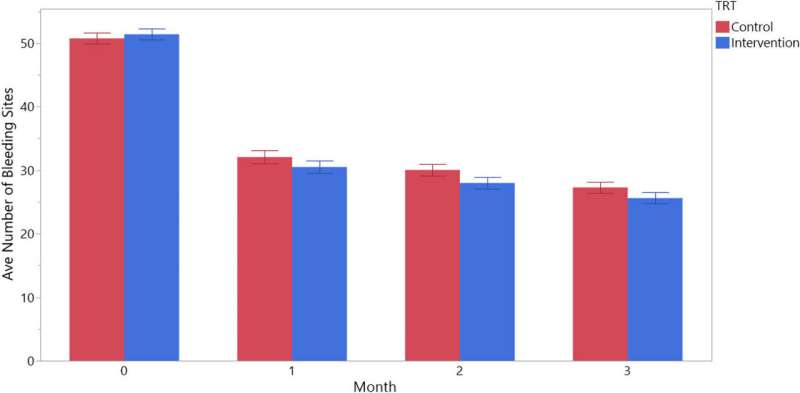This article has been reviewed according to Science X's editorial process and policies. Editors have highlighted the following attributes while ensuring the content's credibility:
fact-checked
trusted source
proofread
Brushing and flossing teeth can reduce pregnancy-associated gingivitis

A study conducted by researchers at the University of Alabama at Birmingham School of Dentistry has shown that nurse-led oral hygiene education has been proved to reduce gingival inflammation in pregnant women. The findings are published in the Journal of Midwifery & Women's Health.
According to the Centers for Disease Control and Prevention, 60% to 75% of pregnant women have gingivitis due to hormonal changes that occur during pregnancy. Periodontal diseases can represent an inflammatory and microbial burden to the body that has been associated with poor pregnancy outcomes, including preterm birth and low birth weight.
"Through our study, we found that treatment of gingivitis during pregnancy can reduce the risk of preterm birth," said Nicolaas Geurs, DDS, dean of the UAB School of Dentistry. "The main takeaway from this study is that those who are pregnant should keep plaque off their teeth, which can easily be done through good oral hygiene, or brushing and flossing."
The study was conducted among 750 pregnant women between eight and 24 weeks of pregnancy with moderate to severe gingivitis. Black women made up two-thirds of participants.
Each participant received oral hygiene instructions and the items needed to maintain a good oral hygiene regimen, including a toothbrush, toothpaste and dental floss.
Both groups of participants showed significant improvement of oral health, which was shown by a decrease of bleeding sites compared to baseline levels.
In addition to the at-home oral health care regimen, Geurs and his team also focused on a model of care that combines both oral and prenatal care. They conducted the study at obstetrics clinics located at two medical centers.
At those clinics, Geurs and his team trained the nurse-led staff on providing oral hygiene instructions to patients. They found that the integration of oral health and medicine also played a role in improving the oral health of pregnant women.
"Oral health is critical for overall health," Geurs said. "By working with the nursing staff and training them on how to provide oral hygiene instructions when a patient comes in for prenatal care, we found that we can make an impact on a patient's overall health."
More information: Nicolaas C. Geurs et al, A Randomized Controlled Clinical Trial of Prenatal Oral Hygiene Education in Pregnancy‐Associated Gingivitis, Journal of Midwifery & Women's Health (2023). DOI: 10.1111/jmwh.13486




















